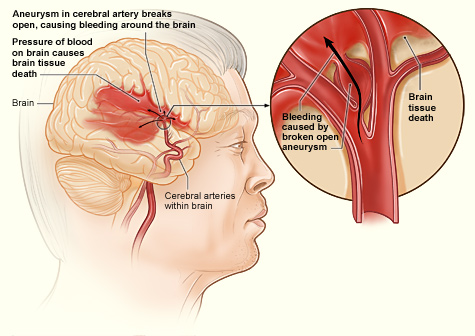THINK YOU ARE HAVING A STROKE? CALL 9-1-1 IMMEDIATELY!F.A.S.T. is an easy way to remember the sudden signs of stroke. When you can spot the signs, you’ll know that you need to call 9-1-1 for help right away. F.A.S.T. is: |
||||||||
|
||||||||
Know the Signs
Knowing the warning signs of stroke and controlling stroke’s risk factors can lower your risk of death or disability. If you suffer a stroke, you may not realize it at first. The people around you might not know it, either. Your family, friends, or neighbors may think you are unaware or confused. You may not be able to call 911 on your own. That’s why everyone should know the signs of stroke and know how to act fast.
Warning signs are clues your body sends to tell you that your brain is not receiving enough oxygen. If you observe one or more of the following signs of a stroke or “brain attack,” don’t wait. Call 911 right away!
Common Signs of Stroke
These are warning signs of a stroke:
- sudden numbness or weakness of the face, arm, or leg, especially on one side of the body
- sudden confusion, trouble speaking or understanding
- sudden trouble seeing in one or both eyes
- sudden trouble walking, dizziness, loss of balance or coordination
- sudden severe headache with no known cause.
Other danger signs that may occur include double vision, drowsiness, and nausea or vomiting.
Don’t Ignore “Mini-Strokes”
Sometimes the warning signs of stroke may last only a few moments and then disappear. These brief episodes, known as transient ischemic attacks or TIAs, are sometimes called “mini-strokes.”
Although brief, TIAs identify an underlying serious condition that isn’t going away without medical help. Unfortunately, since they clear up, many people ignore them. Don’t ignore them. Heeding them can save your life.
Why It’s Important To Act Fast
Stroke is a medical emergency. Every minute counts when someone is having a stroke. The longer blood flow is cut off to the brain, the greater the damage. Immediate treatment can save people’s lives and enhance their chances for successful recovery.
Ischemic strokes, the most common type of strokes, can be treated with a drug called t-PA that dissolves blood clots obstructing blood flow to the brain. The window of opportunity to start treating stroke patients is three hours, but to be evaluated and receive treatment, patients need to get to the hospital within 60 minutes.
What Should You Do?
Don’t wait for the symptoms of stroke to improve or worsen. If you believe you are having a stroke, call 911 immediately. Making the decision to call for medical help can make the difference in avoiding a lifelong disability and in greatly improving your chances for recovery.
If you observe someone having a stroke – if he or she suddenly loses the ability to speak, or move an arm or leg on one side, or experiences facial paralysis on one side – call 911 immediately.





